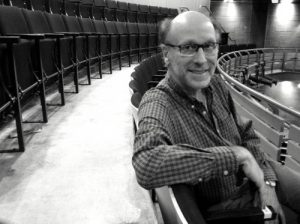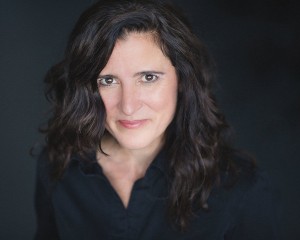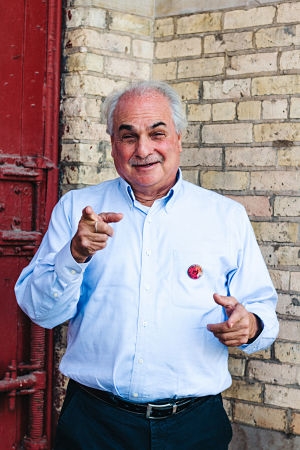At its national conference in St. Louis June 14-16, TCG asked four theatre leaders to answer the question: How does the role of artistic director need to change for today’s world?
All four delivered these “vision statements” as speeches to fellow leaders assembled for an artistic directors summit on Thursday, June 14. They are published here with their permission.
Modeling a Better World

The theatre is a utopian enterprise that impacts our world by modeling a world that is better. It does this in a few different ways. It does it through the plays we produce on our stages, which, even though they are built on conflict, model the give and take of ideas, the depth of human struggle and connection, and the possibility of one person living imaginatively inside the skin of another.
It does it through the inspiring process whereby shows come to life—the way artists with different skills and backgrounds collaborate to create an experience for others, and the emotional commitment they make to re-enact it night after night.
It does it in the way we gather an audience, all in the same place at the same time, to take in something stimulating and provocative, and then to debate about it peacefully.
Finally, theatre models a better world through the institutions that enable theatre to happen—in the people they draw together, the way those people are trained and supported, how they interact with each other and the communities around them, the values they project to the world.
Artistic leadership encompasses all of the above. And right now all these dimensions of our work are changing in a particular way. We have arrived at a moment in our history when all the choices we make will be viewed through the lens of political and social justice.
We know the great justice-related questions of our time, they couldn’t be more obvious:
- Whether our nation will be a haven where people of different races and backgrounds live and work together, a place of even-handed law and opportunity, or whether we will erect walls and prisons that divide people from others perceived to be different
- Whether wealth and power will be distributed rationally, or whether they will be accumulated in the hands of a very few, while many others lead lives of struggle and persecution
- Whether we will have a healthy planet that continues to provide sustenance and inspiration, or whether the lives of the least protected will be cut short by environmental disasters and genocidal wars
The challenge for the artistic leaders of tomorrow is clear: How will your answers to these overwhelming questions of political and social justice affect the way you choose plays, gather and support artists, welcome and engage audiences, and structure and build your organizations? How will your theatre model a better world?
The leaders of tomorrow will inherit more institutional assets than their predecessors did, in the form of buildings, budgets, boards, donors, strategic plans, etc. These assets will be a platform for the things you hope to accomplish, but they may also stand in the way.
Here are a few hard questions that new artistic leaders are sure to face, and which might require some upending of institutional structures:
- How can we spend more money to compensate artists fairly and elevate the purpose of their work, and at the same time charge audiences less so we can engage with the fullest range of citizens?
- How do we create zones of respect and safety in our rehearsal rooms, while tackling work that is intentionally prickly and uncomfortable on our stages?
- How do we welcome the widest range of identities and aesthetics in our artists, and at the same time cultivate our own personal standards of taste and excellence, as required of us as leaders?
- How do we welcome audiences and supporters with wide-ranging backgrounds and viewpoints, for plays with diverse characters and sentiments, in an environment where people are cocooning themselves to avoid hearing things they don’t already agree with?
- How can we speak truth to power in our work, at the same time that we connect our institutions to the financial and power structures of our communities in order to build more resources?
One thing I know for sure: No amount of institutional assets will keep you from the feeling that you are constantly on the front lines, making the case for our art form, and reinventing the strategies whereby it can be supported and shared with your community, just as our godmothers Nina Vance, Margo Jones, and Zelda Fichandler did over six decades ago. To make the theatre you believe in, you will need to change hearts and minds in the world you live in.
Howard Shalwitz, artistic director, Woolly Mammoth Theatre Company, Washington, D.C.
Be Like Michelle

Thank you, TCG, for inviting me to share my thoughts on transformative leadership with this illustrious (and terrifying) room full of artistic directors. Yikes!
First off I’d like to define my terms. For me a transformative leader is one who changes the behavior, attitudes, and culture of their community. In the theatre, I define community as both internal—board, staff, artists, crew, and audience of a particular theatre—and external: the neighborhood and town or city of which that theatre is a part, as well as the national theatre community impacted by the decision-making of each theatre within its ecosystem.
One who changes the behavior, attitudes, and culture of their community. But toward what? Toward the community’s greatest, most expansive, most daring and empathetic self.
When I think of transformative leadership, I think of Michelle Obama. Michelle more than her husband, actually, because from her position I believe she was more effective in changing the behavior, attitudes, and culture of her community—which is in her case, well, the entire nation.
I select Michelle Obama specifically as a model for transformative leadership in 21st century theatre because she is:
- Progressive
- Outspoken
- Of the people
- Savvy and flexible, and
- Imaginative
And underpinning all of these traits is her clear vision for what her community could be, and her deep, abiding, and passionate belief in her community’s ability to rise to its greatest self.
Let’s take her qualities one by one.
Progressive. In thinking of leadership in the theatre, I think of progressiveness on two fronts: civic and artistic. On the civic front, a progressive platform roots itself in the belief that each person has a voice and each person is valued, heard and cared for. Equity, Diversity, and Inclusion are embedded within progressive values. Inclusion of multiple voices is always already a given.
On the artistic front, progressive to me means work that surprises and delights, defies expectation, and expands our understanding of the world of which we are a part. A great example of the marriage of both civic and artistic progressiveness is Niegel Smith’s production of Father Comes Home From the Wars by Suzan-Lori Parks, currently at Goodman Theatre.
Oustpoken. We know Michelle Obama is plenty outspoken and has regular opportunities at the mic. How is a theatre outspoken? I’d argue a theatre has the opportunity to express its progressive values in everything it does: every person hired, every production programmed, every board member recruited, every piece of communication, every person brought into the audience, and every conversation. At every point of decision, a theatre and its leadership have the opportunity to speak their progressive values loudly and clearly.
This requires a leader with a high risk tolerance. Outspokenness runs the danger of creating pushback and conflict within the community. But we learned where “Talk less, smile more” gets someone. The best leaders hedge daring risk-taking with the ability to engender genuine trust. To move a community forward you must have the trust of that community. And this is where Michelle Obama’s next set of traits come in.
Of the people. From singing in cars to going to Walgreens with Ellen to her countless meetings with people of all ages and walks of life, Michelle Obama creates a genuine relationship with her community (and may I remind us again here that her community has generally been the entire nation). I had the opportunity to meet her and her husband at a fundraiser following a production of a play I directed in Chicago. While the then U.S. Senator worked the room, I had the opportunity to speak with Michelle for 15 minutes or so, and within the first 5 minutes she made me feel as though we’d known one another for years. She was engaged, curious, and present. Those qualities when in conversation with a member of one’s community allow a leader to truly connect with another person and begin the process of creating trust.
Savvy and flexible. One of the things I watched during her tenure in public office was Michelle Obama’s savvy and flexibility in handling the many waves of public opinion. She had a knack for keeping her finger on the pulse of her community, and adjusting her messaging accordingly. Not in a smarmy political way; rather, she listened closely and adapted her communication style so her community could hear her better. The measure of a leader’s synergy with their community is their ability to recognize when the needs of their community shift and to adjust their approach to meet that shift.
Imaginative. Innovation follows imagination. Not to dock another of my heroes, Hillary Clinton, but I’m not sure imagination is her strong suit, and I think that has cost her. What both Obamas have is great imagination: the ability to envision a new idea and to capture their community’s imagination with that vision. Further, a transformative leader must have the imagination to envision new ways forward when the first idea fails, as it inevitably will.
So to wrap up: to me a transformative theatre leader in the 21st century is one who effects positive change in the behavior, attitudes, and culture of their community; who is progressive, outspoken, of the people, savvy and flexible, and imaginative; who uses these superpowers toward their clear vision of what theatre can do within their community; and who believes passionately in the capacity of both the art form and the community to bring us to our greatest selves.
Lisa Portes, freelance director and head of directing, the Theatre School at DePaul University
Right-Sized and Open-Minded

Artistic directors: Take us from nicety to necessity, and transform our organizations, our art form, and our field to become indispensible to our regions, and not simply in terms of quality of life or as an economic engine.
The regional theatre movement was about decentralization, and we need to recentralize our theatres in our communities—recenter ourselves in the daily civic lives of our communities.
What is a healthy community and how do we participate in it? How can our theatres immerse themselves in issues of safety, poverty, the justice system, health care, transportation, water, politics, power imbalances, and so much more? Let’s involve and engage the populace (not just subscribers) and respond to its public will, its poetic will, and its political will.
Artistic directors: We can stop being the expert and become the arbiter. We often do things for and not with. It’s time for that to change.
Let’s recognize theatre as product and tool.
Artistic directors are the mediators that foster discourse around society and democracy. A.D.s need to understand and believe that this community-based art is good art with a solid aesthetic (and it’s where the money is and will be flowing). Artistic directors need to have a moral imagination.
ROI, return-on-investment—it’s been hard for me to acknowledge that the making of plays is the most inefficient manner of effecting change. The number of dollars spent to reach the numbers of people we reach in hopes of changing attitude, behavior, and policy—it’s bad math. Let’s do better.
The more earned income-reliant we become, the more risk-averse we become. Artistic directors: Reverse that. Please.
Know that adaptability is the new sustainability. Purpose and principles supersede survival.
Also:
- Know your place and your organization’s role on the privilege-inequity-responsibility continuum.
- Transform EDI from an aspiration to the understood foundation of your institutional culture.
- Make Jubilee obsolete before it happens because that’s the work you do.
- Allow the Kilroys to stop because of the choices you make.
- Allow there to be fewer theatres because you’ve led your board in sunset conversations, not because of impending diminished resources but because of mission realization.
Embrace that theatres and plays sometimes get in the way of theatre—the performance/audience relationship is morphing.
Desegregate canon-based theatre, devisers, and improv.
With all of these job openings being discussed perpetually, and as you traverse the opportunities, eschew the notion that the trajectory should be to bigger. Size doesn’t matter. Don’t think small, mid-sized, or large based on budget or number of seats or any indicator; think in terms of “right-sized”: Those who do what they want to do at the caliber they want to do it with the resources they have. Be right-sized.
It is the artistic director’s job not to ask audiences what they want to see and pander to that, but rather to lead audiences to see that which they don’t yet know they want to see. Ask questions. Lots of them. Provide vision. Lead!
Above all, lead organizations that welcome introspection, self-criticism, and dissent.
Jack Reuler, artistic director, Mixed Blood Theatre
Liberate the Classics, and Ourselves

Our democracy is being hijacked. People are being killed. Water is being poisoned. Schools are being shot up. Families are being seperated. Prisons are being filled with people whose only crime is existing. Ice caps are melting. Storms are storming. Entire species are becoming extinct. Mosques are being burned. Bombs are being dropped and children are catching them. Drug addiction is at an all-time high—for white people. Bathrooms are hostile territories. Identities are being weaponized. Equity, Diversity, and Inclusion work is being colonized. This is the backdrop against which we plan and produce our seasons.
Against this backdrop: We strive to produce classic plays in ways that do not reify oppressive norms. This is not always possible—fucked-up shit was happening back in the day—but we value practitioners who have the curiosity, creativity, and analysis to work toward that end with humility and rigor. We are mindful that reverence for and adherence to classical norms can undermine our efforts to dismantle white supremacy. We can hold the truth of both the greatness of classical plays and the ways in which they were used as tools of colonization, erasure, and cultural genocide.
We analyze historical and current manifestations of oppression in order to make artistic choices that affirm the liberation and humanity of those who have been dehumanized. We hold that plays that interrogate, indict, impose upon, and incite outrage from those in power are necessary tools in dismantling systemic oppression.
We prioritize the comfort and safety of those seeking liberation— in our audience, in our company, and on our stages. We know that terms like “traditional, classic, universal, and transcendent” are codes of white supremacy that centralize whiteness, European-ness, heterosexuality, maleness, cisgendered-ness, able-bodiedness, Judeo-Christianity, documented citizenry, and the English language. We work to recalibrate our artistic sensibilities in order to ensure that these identities are not the barometer by which we define our aesthetic values.
“Culturally specific” is a phrase we use when also describing white-authored plays. We are clear that whiteness is a culture.
We are careful not to enter our education and community work with a missionary complex. That is, we don’t decide that our Shakespeare productions are what’s best for communities who are otherwise not even thought of when we plan our seasons. We let them decide what is needed for their liberation.
We unequivocally believe in people’s right to tell their own stories. Full fucking stop. We have a responsibility to illuminate the human condition onstage and improve the human condition offstage. We cannot do one without doing the other.
Black lives matter.
We advocate for stories that are intersectional. We know that putting stories in binary boxes only serves to strengthen oppression. We believe in self-identification and self-determination. We check our tendency to define others. We recognize that oppression is not bi-directional. We cannot entertain the notion that calling out oppression is an act of oppression. We literally. Just. Can’t. With y’all.
We do not have to be reminded that regional theatres were formed at a time when people of color were being lynched, could not vote, endured segregation and police brutality, had their stories erased or revised by a racist educational system, and sat in the back of our theatres, if at all. A time when simply existing was an act of bravery. We own that our theatre was founded and funded by white supremacy and we know that whiteness will not dismantle its own fortress.
Mica Cole, repertory producer, Oregon Shakespeare Festival

